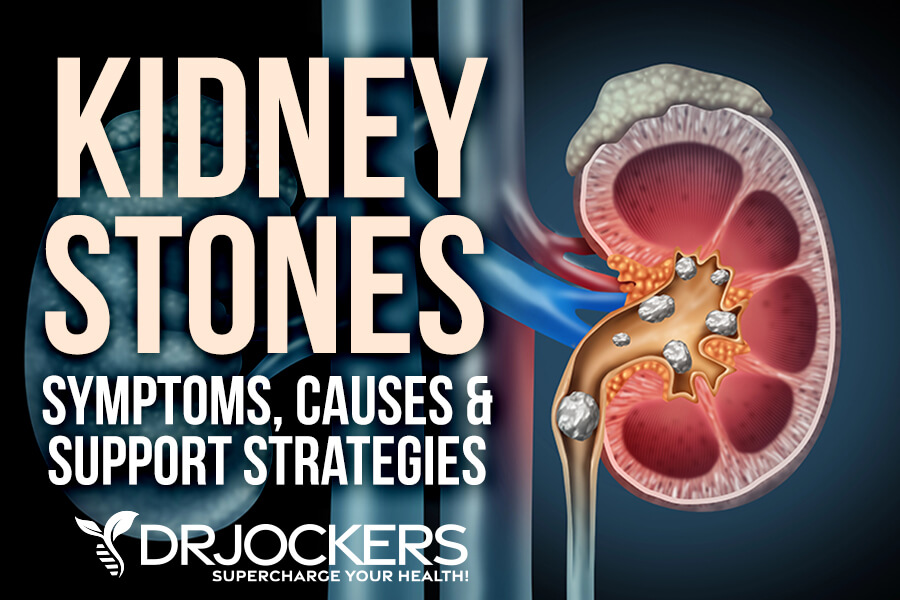
Kidney Stones: Symptoms, Causes and Support Strategies
Kidney stones are a great fear for many people. The pain of kidney stones is described as one of the worst possible pains you could possibly experience. While the causes behind kidney stones are not fully understood there is some common nutritional advice that can help prevent these stones from forming.
Kidney stones come in a number of different forms. Understanding the type of stone is key to preventing it from re-forming. The most common kidney stones are by far calcium oxalate crystals which account for 80% and uric acid crystals which account for another 5-10% (1).
The goal of this article is to help you find the best strategies to work with your unique genetic makeup to improve kidney health. We will discover the underlying mechanisms behind kidney stone formation, major symptoms, and natural support strategies.
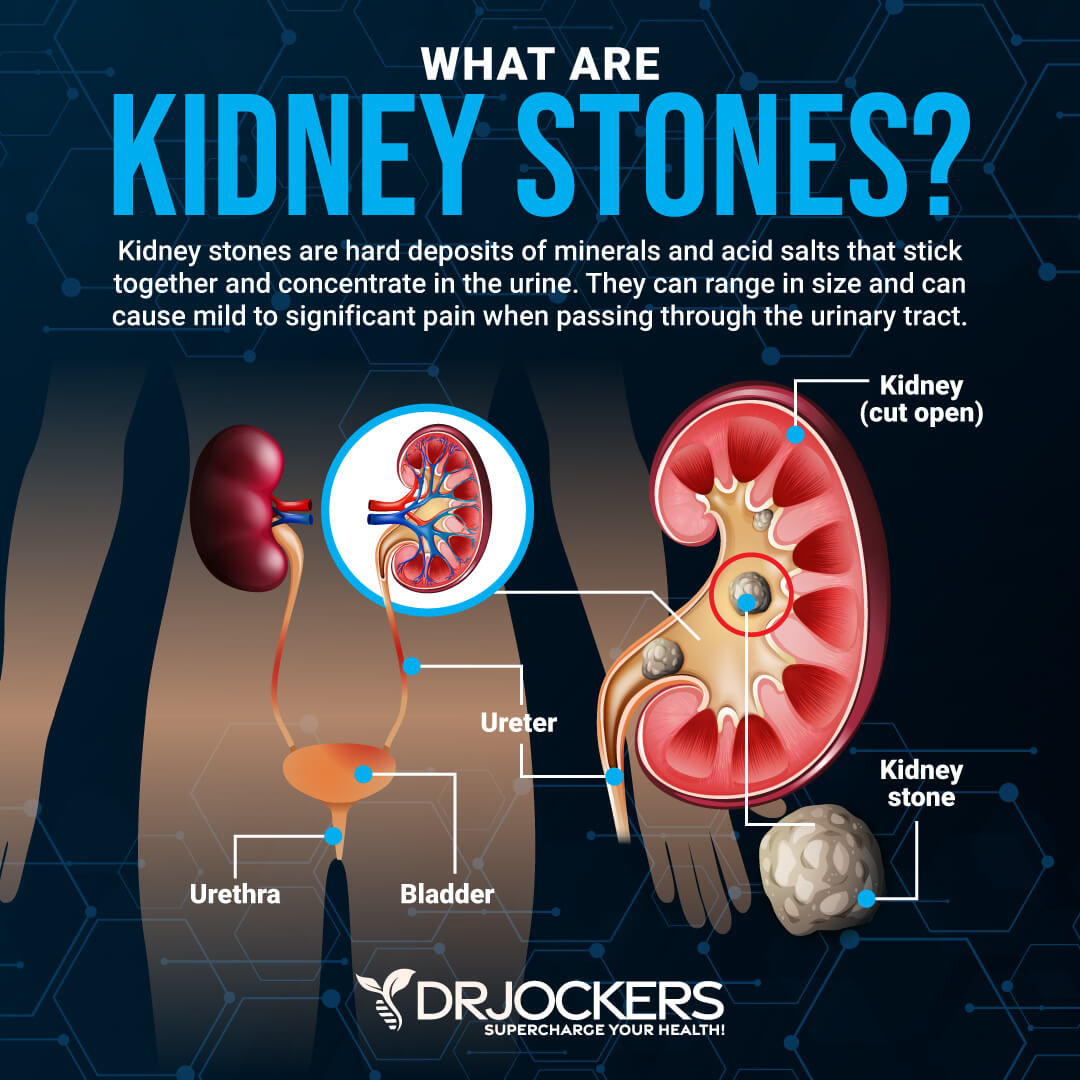
Fructose and Kidney Stones:
Certain foods that are commonly consumed in the United States promote kidney stone formation. High fructose consumption is linked with increased excretion of calcium, oxalates, and uric acid, which are all associated with an increased risk of kidney stones. Research has shown that high fructose diets are at greater risk for kidney stone formation (2, 3, 4)
Soft drinks with phosphoric acid significantly increase calcium excretion and kidney stone formation (5). Soft drinks and sweet teas are perhaps the biggest dietary causes of kidney stone formation because they often contain high levels of both fructose and phosphoric acid (6)
Major Factors with Kidney Stones:
Here are 6 major factors often seen in kidney stone formation:
Dehydration: This causes low urine volume and less fluid to grab up calcium and other compounds in the urinary system. This is the easiest thing to address. You should be urinating every 1-2 waking hours and unless you take a B vitamin supplement your urine should be relatively clear.
High Urinary Calcium: This can be due to a very high calcium intake, typically from supplements or from vitamin D toxicity where levels are over 150 ng/ml. This would be due to very large supplementation as well. Getting vitamin D levels tested and urinary calcium and phosphorus levels will determine the major cause.
Hyperoxaluria: High oxalates in the urine increase the risk of calcium oxalate kidney stones. This can be due to a genetic metabolic issue or due to decreased levels of oxalate metabolizing bacteria in the gut and/or a yeast overgrowth (7, 8). Vitamin B6 deficiencies also increase levels of oxalates in the urine (9, 10).
Hypocitraturia: This refers to low levels of citric acid in the urine. It is found in at least 20% of kidney stone formation (11). It is typically caused by distal renal tubular acidosis, hypokalemia, bowel dysfunction, and a high-protein, low-alkali diet. Genetic factors and medications may also play a role.
Most commonly it is found in individuals with small intestinal bacterial overgrowth and a highly acidic diet that is low in alkaline buffering minerals (12).

High Sodium Intake: A high sodium intake can create mineral imbalances in the body. If you are on a moderate-high carbohydrate diet your body will naturally retain sodium and can cause more problems with mineral balance. Low-carbohydrate, high fat (ketogenic) diets excrete sodium and therefore need more good salts (13).
Stay away from processed salts and processed sodium rich foods and consume natural foods, stick to a low-moderate carbohydrate, high good fat diet, and consume unprocessed sea salts and pink salts.
High Uric Acid Levels: Elevated uric acid is also associated with gout and cardiovascular disease. High uric acid is most commonly seen with high fructose consumption.
When cells become damaged and are replaced their DNA/RNA degrade into purine molecules which are then metabolized into uric acid. High fructose consumption causes cells to burn up their energy stores and go into a state of shock that leads to massive cellular death (14). This cellular die-off leads to excessive increases in uric acid.
A study published in the Journal of the American Medical Association demonstrated that individuals who drink one fructose-rich beverage a day are 74% more likely to develop gout than those who drink the same beverage once per month. Individuals who drank two or more fructose sweetened beverages are 97 percent more likely to develop the disease (15).
Identifying the Cause of Your Kidney Stones:
If you or a family member have had a kidney stone it is important to find out what kind of stone it was and work with a health care practitioner to find out which of the above mechanisms were in action to create the stone.
If you are unable to find out what form of stone it is then consider the most common forms. Roughly 80% of all stones are calcium oxalate while 5-10% are uric acid. If you or a parent or sibling has gout you may consider uric acid as an issue.
If you are taking very high doses of vitamin D or are often dehydrated then address those issues. Additionally, adding in more lemon and lime is a great way to add more potassium citrate to your diet and keep your body more alkaline which will reduce any chance of hypocitraturia.
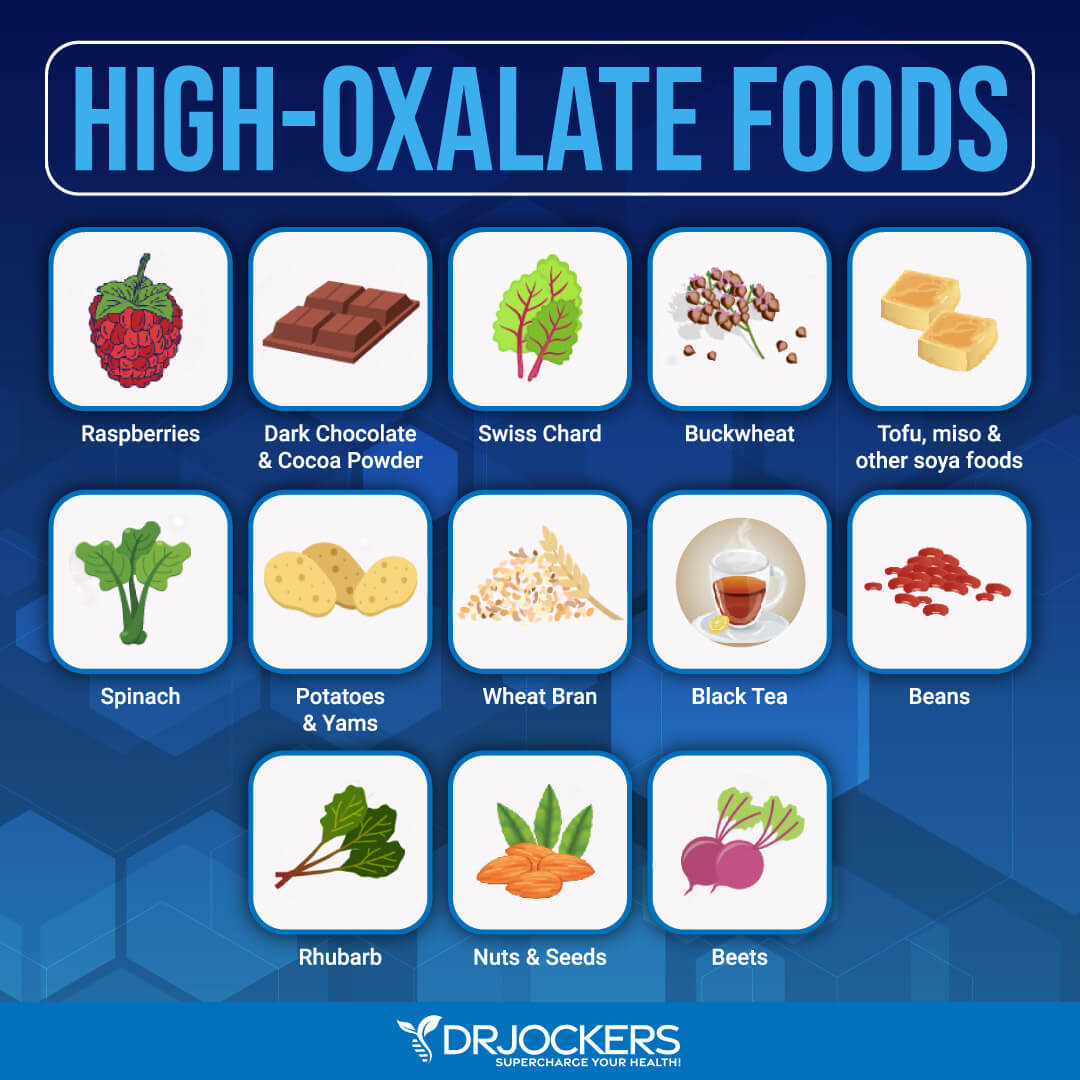
Elevated Oxalates and Kidney Stones:
Oxalates are naturally occurring compounds in plants, animals, and humans. The body is naturally able to synthesize oxalates from various compounds such as excess vitamin C, fructose as well as yeast. Vitamin B-6 deficiency, magnesium, and thiamine deficiency are also ideal circumstances for increased oxalate synthesis. (16, 17)
If one has a genetic issue that creates high urinary oxalates that needs to be addressed. Additionally, one may have nutrient deficiencies or yeast overgrowth and a lack of oxalate metabolizing probiotic organisms in their gut (18, 19). All of these conditions can lead to dangerous elevations in oxalates that predispose one to developing kidney stones.
These are considered the most common causes for kidney stones and therefore I recommend functional testing to see if you are at risk.
Testing For Oxalate Metabolism:
Clinically, I use the Great Plains Laboratory organic acid test to determine if someone has elevated oxalates in their system. This is a simple urine test done in the comfort of your own home.
When I see elevated oxalic acid with elevated glyceric or glycolic acid it is usually a sign of a genetic hyperoxaluria. When oxalic acid is elevated without an elevation in glyceric or glycolic acid it is typically related to Candida Albicans overgrowth or a very high vitamin C intake.
This test also lets me analyze for vitamin B6 deficiencies and for Candida overgrowth which are both major causes of hyperoxaluria (20, 21, 22). From a functional nutrition and natural medicine perspective this test helps me to determine the cause and best diet and treatment for this condition.
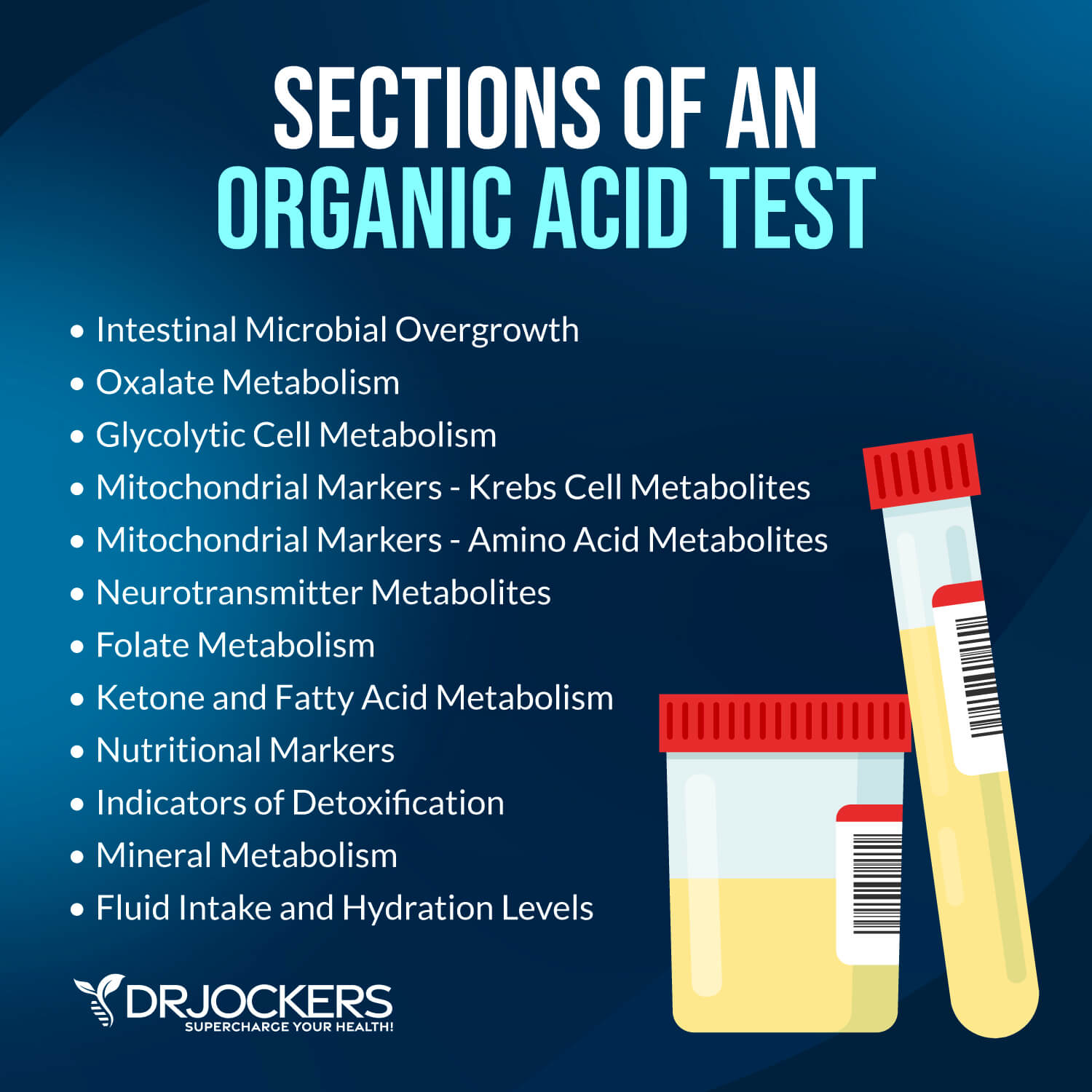
Detox Diet for Healthy Kidneys:
An anti-inflammatory lifestyle is important for reducing kidney stone formation. This begins with drinking at least half your body weight in ounces of clean, pure water. Next, we need to eat a diet rich in phytonutrient dense vegetables, healthy fat, and clean protein sources.
Healthy fat sources include coconut products, avocados, olive oil, & purified omega-3 fish oil supplements. Healthy protein includes wild caught fish, grass-fed red meat, and free range chicken, turkey, and eggs. Anti-inflammatory herbs such as raw ginger (not ground), cilantro, sage, and basil are also powerful aids.
Other helpful foods for the kidneys include cranberries, dandelion root, greens, cucumbers, beets, celery, and onions. However, be careful as beets are very high in oxalates so if you have calcium oxalate stones it is best to avoid it. The raw celery is moderately high in oxalates so be careful not to consume more than 2 bunches per week.
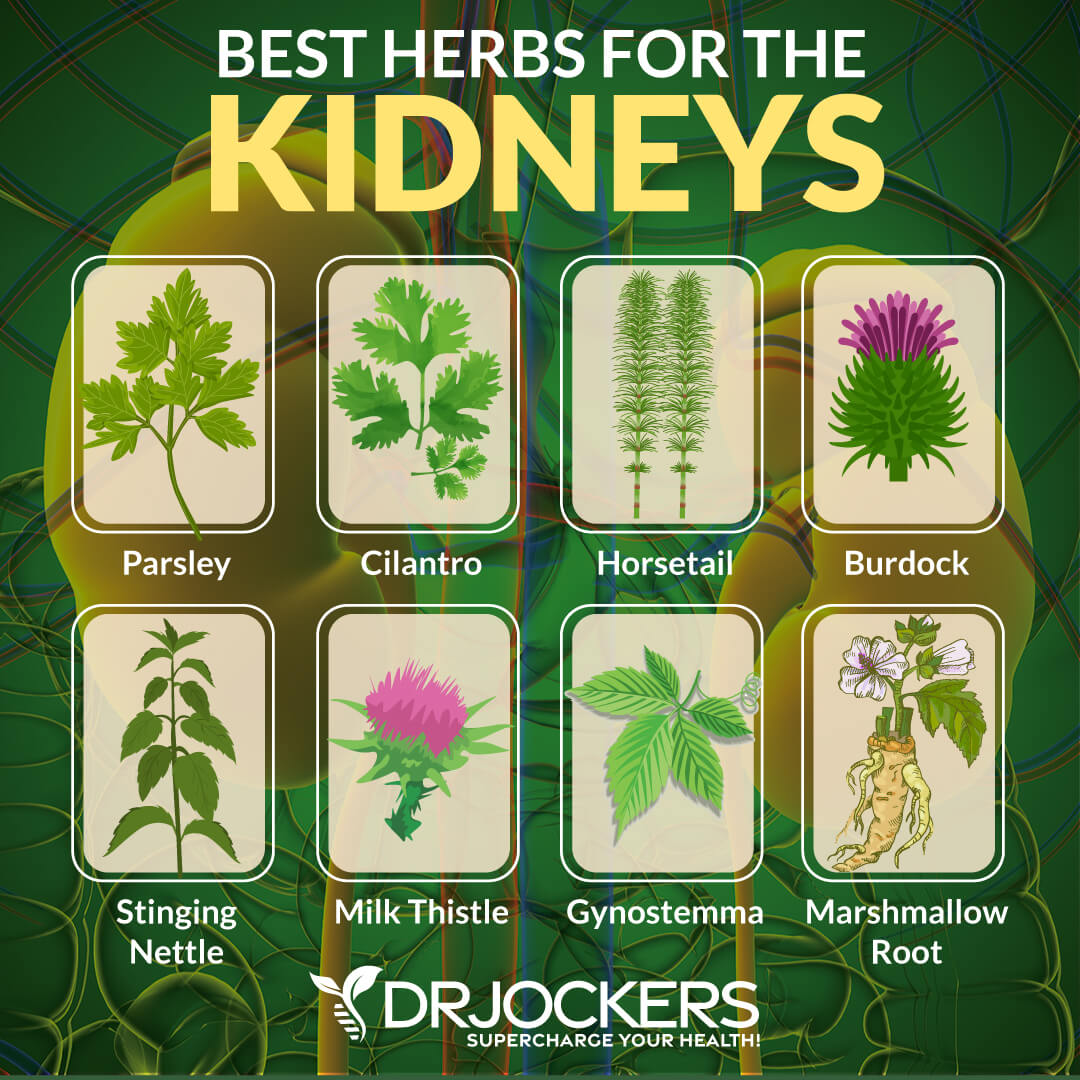
The Importance of Citric Acid:
The major antagonist to calcium-based stones is citrate. Citrate is present in citrus fruits. Drinking freshly squeezed lemons in water (see recipe below) can be a very effective remedy for kidney stones.
Citrate supplementation is also very effective when it is combined with potassium and magnesium which is the form it comes in with fresh squeezed lemons and limes. This combination will make the urine less acidic and therefore help decrease the potential to form stones.
A 2007 study showed that the addition of alkali forming elements in potassium-magnesium citrate is an effective tool to reduce kidney stone formation. Despite an increase in urine calcium concentration, the relative saturation of calcium oxalate decreased due to citrate chelation of calcium and the concentration of undissociated uric acid decreased due to the significant increase in urine pH (23).
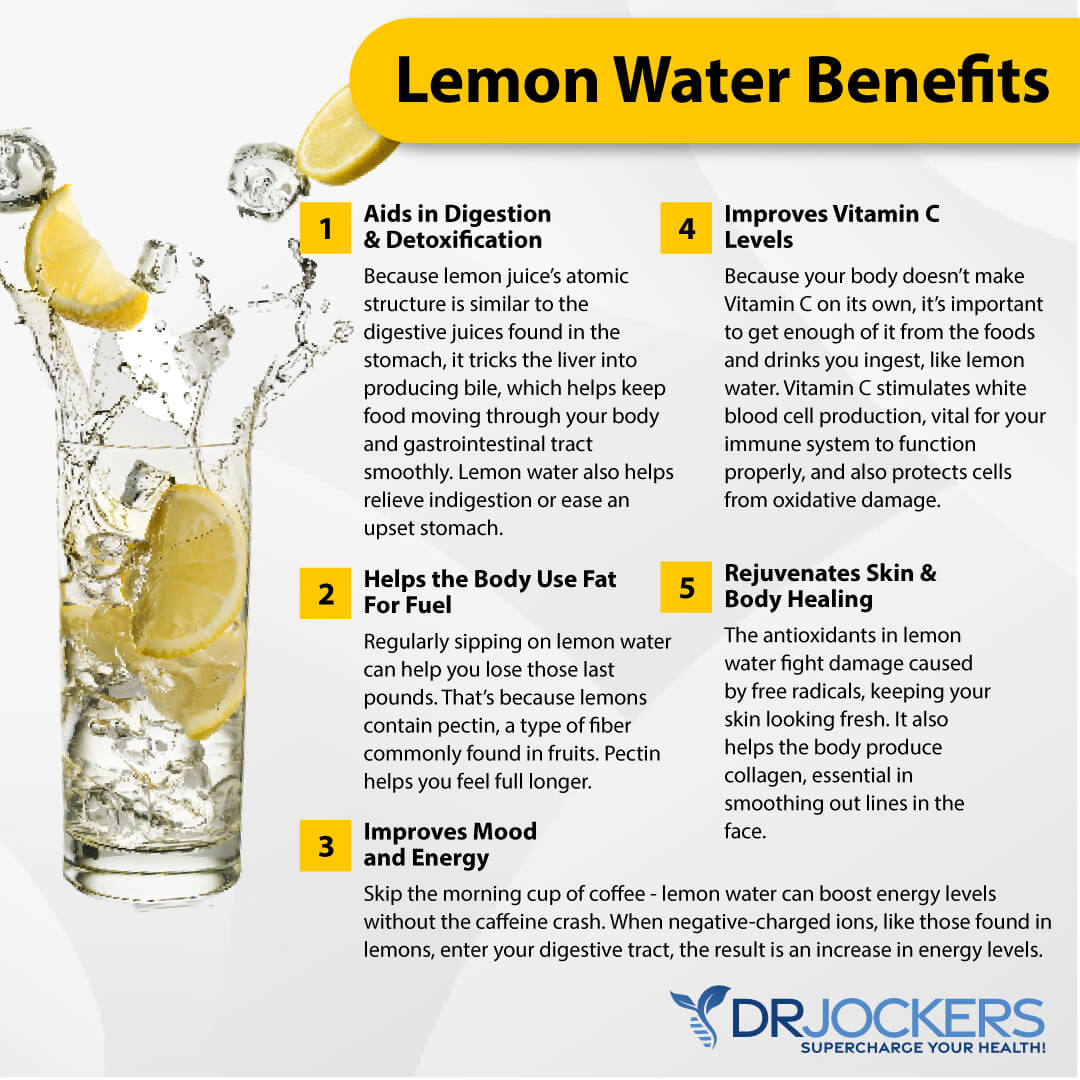
Low Oxalate and Low Fructose Diets:
A low-oxalate diet is important for anyone who has had calcium oxalate kidney stones or has a genetic susceptibility to them. Foods rich in oxalates include beer, chocolate, nuts, spinach, chard, raspberries, certain teas, beets, & wheat germ. Reducing fructose content is also especially important for the reasons described earlier in the article.
Vitamin C metabolism produces oxalate and some studies have linked vitamin C to increased risk for kidney stone formation (24). More conclusive studies have shown that vitamin C supplementation is recommended as long as it is accompanied by high levels of vitamin B6 (such as lemon) which naturally binds oxalate (25).
Lemon Juice and Olive Oil Protocol:
I have my clients take 2 oz of extra virgin olive oil with 2 oz of organic lemon juice at the onset of kidney stone symptoms. Drink this mix straight and then drink 12oz of purified water right after. Then wait 30 minutes and mix the juice of 1/2 lemon and 1 tbsp of raw apple cider vinegar in 12 oz of purified water and drink this throughout the day.
This will help to dissolve some of the stones and make them easier to pass. Be sure to reduce fructose and oxalate levels during this period of time.
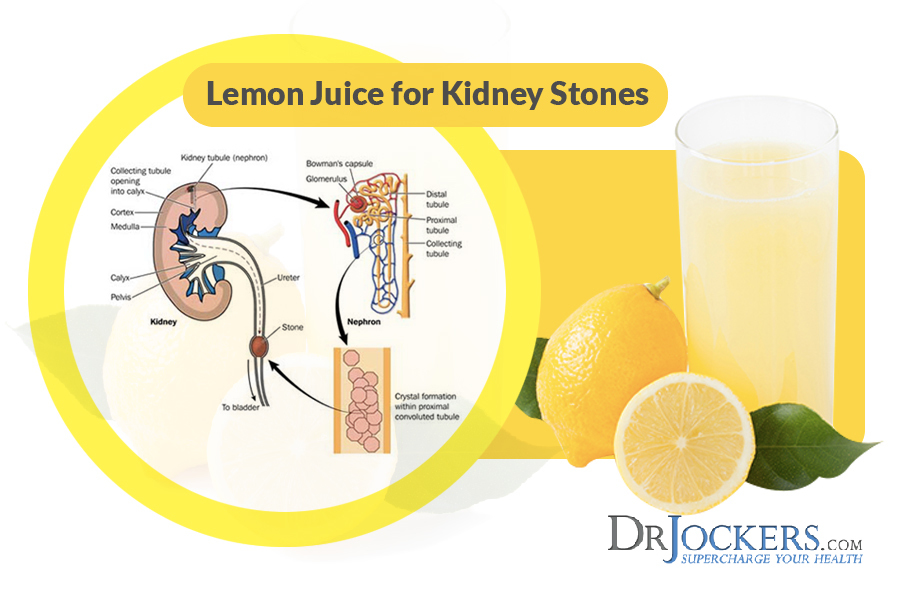
Calcium Metabolism and Kidney Stones:
Healthy levels of calcium bind to oxalate in the bowels before the oxalate is filtered through the kidneys. As the amount of calcium intake decreases, the amount of oxalate available for absorption into the bloodstream increases; this oxalate is then excreted in greater amounts into the urine by the kidneys.
In the urine, oxalate is 15 times stronger than calcium in attracting the formation of calcium oxalate stones. Take in appropriate amounts of calcium by consuming grass-fed dairy products and low-oxalate vegetables such as cabbage and cauliflower.
Vitamin D3 and vitamin K2 work together in synergy to modulate calcium metabolism in the bones. Optimizing your vitamin D levels by getting them between 60-100 ng/ml is extremely important. Additionally, consuming vitamin K2 through fermented foods and supplements is also a powerful tool for enhanced calcium metabolism.
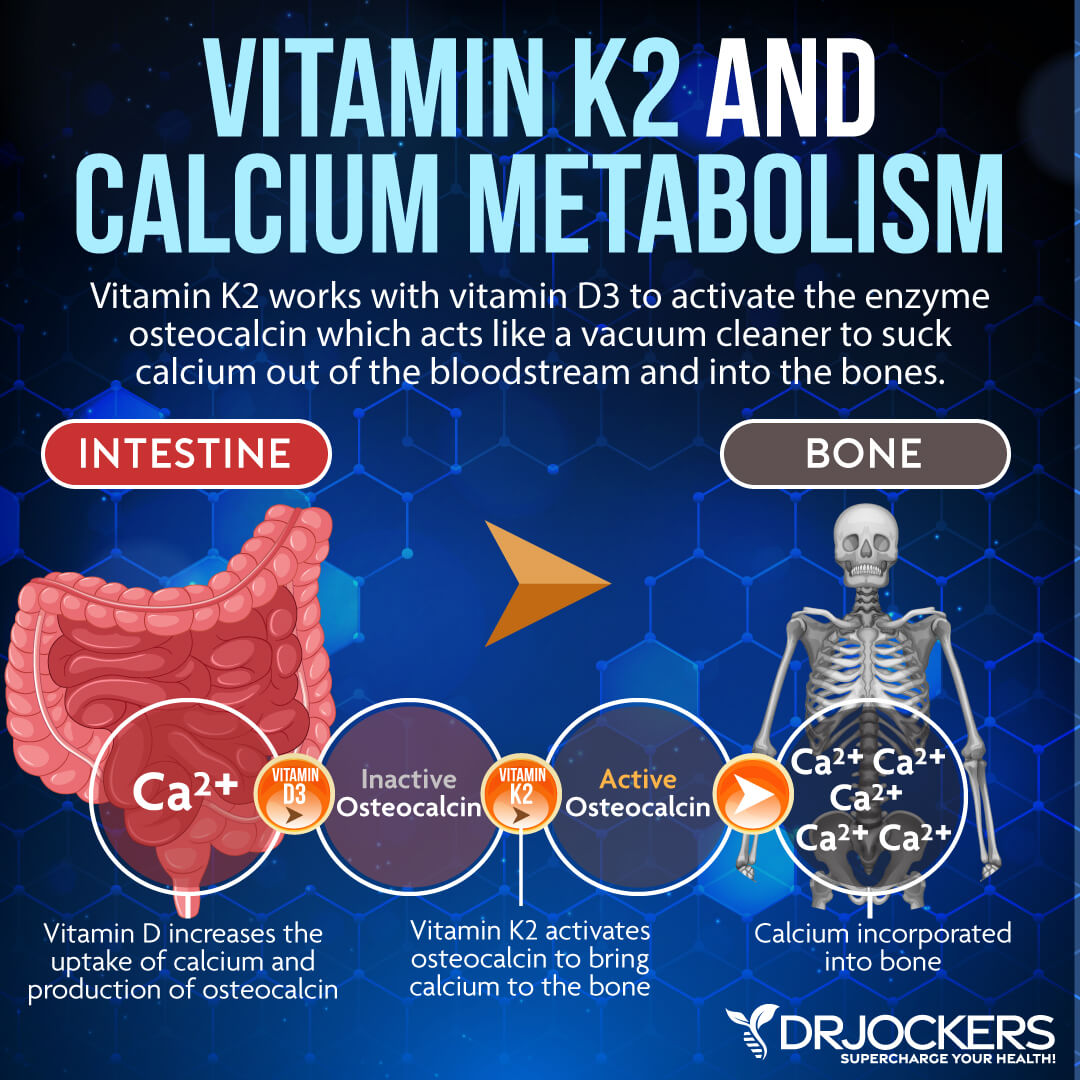
High Uric Acid Levels and Kidney Stones:
Uric acid stones are most often formed through diets high in protein and possibly fructose. Uric acid is a byproduct of protein, alcohol, and fructose metabolism. Some individuals have trouble eliminating this acid which can form gouty crystals as well as particles in the kidneys.
These individuals should avoid alcohol, and purine rich foods such as red meats, organ meats, and legumes. Additionally, they should avoid high fructose corn syrup, honey, agave nectar, and lots of fruit due to the fructose content.
These individuals do very well on foods that are high in oxalates such as spinach, beets, collards, kale, celery, etc. They should be focusing on these foods with high anti-oxidant content to neutralize uric acid levels.
If you have a history of kidney stones, especially uric acid based stones, it is advisable to keep your total fructose intake to under 20 grams per day and ideally 10-15 grams.
Unique Herbs to Support the Kidneys:
Some major herbs such as hibiscus, barberry, and stinging nettle. Hibiscus has been used for centuries to treat urinary tract inflammation and prevent and treat kidney stones. Hibiscus is a key ingredient in many traditional teas used to help flush out kidney stones and stop inflammatory diseases of the urinary tract (26).
Bearberry can help to reduce accumulations of uric acid and relieve the pain of bladder stones by strengthening and imparting tone to the urinary passages. Bearberry contains allatoin which helps soothe, strengthen, and tighten irritated and inflamed tissues(27).
Nettle is also rich in plant sterols, lignans, and flavonoid antioxidants that support the bladder and kidney cell walls (28). These nutrients reduce inflammatory prostaglandins and increase urinary volume to wash out bacteria and toxins from the urinary tract (29). This also helps to prevent and treat kidney stones. The product we use with these

12 Steps to Prevent Kidney Stones:
Here are the best action steps to get started with on your journey to support kidney health naturally. You should always consult with your physician before stopping or changing medications or taking on new health strategies. It is important to note that these strategies are not FDA approved to prevent, mitigate, treat or cure kidney stones and should not be confused as such.
Additionally, you should be working with a functional health practitioner to help guide you through these strategies. This is not an exhaustive list and there are other natural therapeutic strategies that I and functional health practitioners will utilize to help individuals improve kidney health.
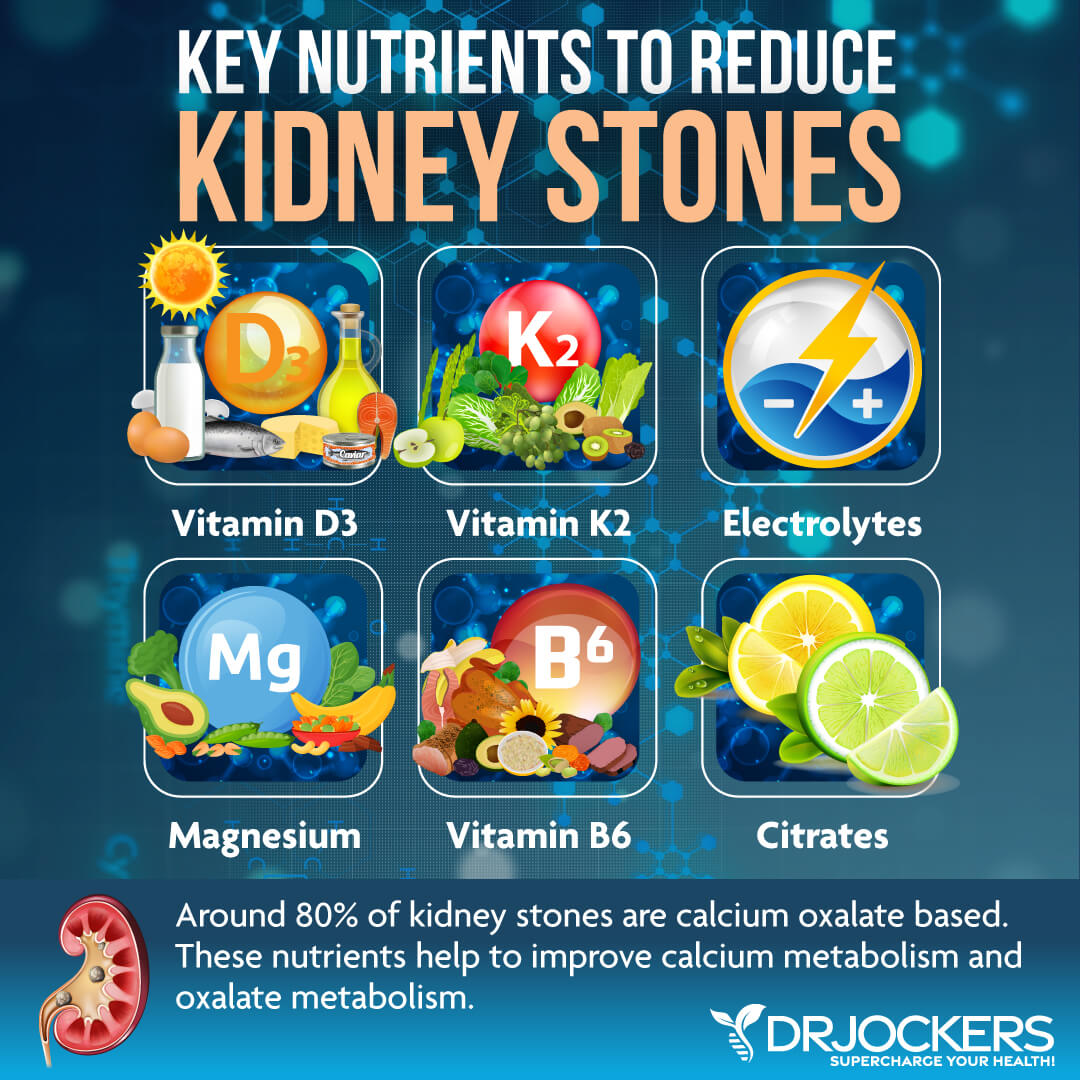
1. Eat an Anti-Inflammatory Nutrition Plan
It is important to focus on eating real foods that are rich in healthy fats, clean protein, fiber, and micronutrients. It is best to reduce the consumption of grains, starches, and sugars as these all increase blood sugar and promote inflammation in the body.
Healthy fats to consume include avocados, olives, olive oil, grass-fed butter, pasture-raised eggs, and organic animal products. I always advise looking for organic, pasture-raised, or grass-fed animal products as they have the most nutrients and the least amount of toxins.
We also want to look to consume a lot of vegetables, fruit, and herbs as these are all rich in antioxidants that reduce inflammation in the body.

2. Optimize Your Hydration Levels:
Really good hydration is absolutely essential for reducing kidney stone formation. I recommend drinking at least 8-16 oz of water within the first 20 minutes of waking and aiming to drink around 32 oz of water before eating anything in the morning.
I highly recommend getting a good water filtration system such as a Reverse Osmosis system to pull out all the harsh contaminants such as chlorine, fluoride, heavy metals and disinfectant byproducts out of the water.

3. Test for Oxalate Elevations:
If you have had a calcium oxalate kidney stone or have a family history of these sorts of stones it would be a great idea to get tested to see how you are metabolizing oxalates. The organic acid test will also look to see if you have issues with yeast and bacterial overgrowth in your small intestine as well as mitochondrial energy production, B vitamin status, and glutathione levels.
I find the OAT to be a fantastic overall test to understand your health status and I recommend getting it done 1-2 times each year. The image below is a review of everything it analyzes through a simple, at home, urine test. You can find more information on it here

4. Consider a Low-Oxalate Diet:
Since 80% of kidney stones involve calcium oxalate, if you have a history of this sort of stone you should consider a low-oxalate diet. I don’t believe that most people need to be super vigilant with this but instead look to reduce their consumption by about 50% from what it currently is.
The main foods to reduce would be nuts, seeds, chocolate, spinach, watercress, sweet potatoes, beets and raspberries. If you normally consume 10 servings of these a week then look to reduce it down to 5 servings a week.
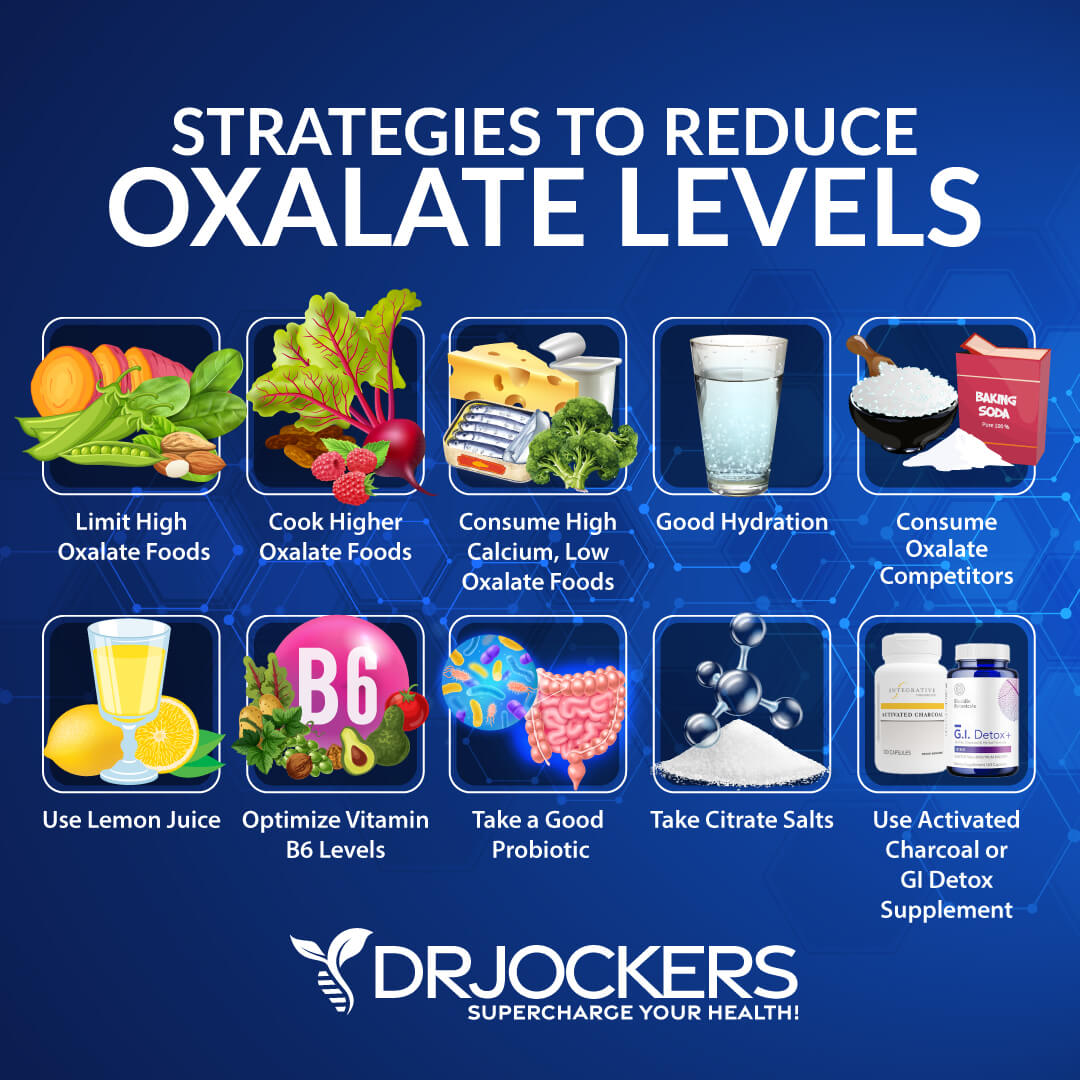
5. Limit Fructose Consumption:
It is important to reduce the consumption of fructose. This includes all processed corn syrups, high fructose corn syrups, and agave nectar. You should also look to limit your intake of honey and high fructose fruit.
Some of the better fruits to focus on would be lower fructose and lower oxalate fruits such as lemons, limes, green apples, blueberries, cherries, strawberries, and blackberries.
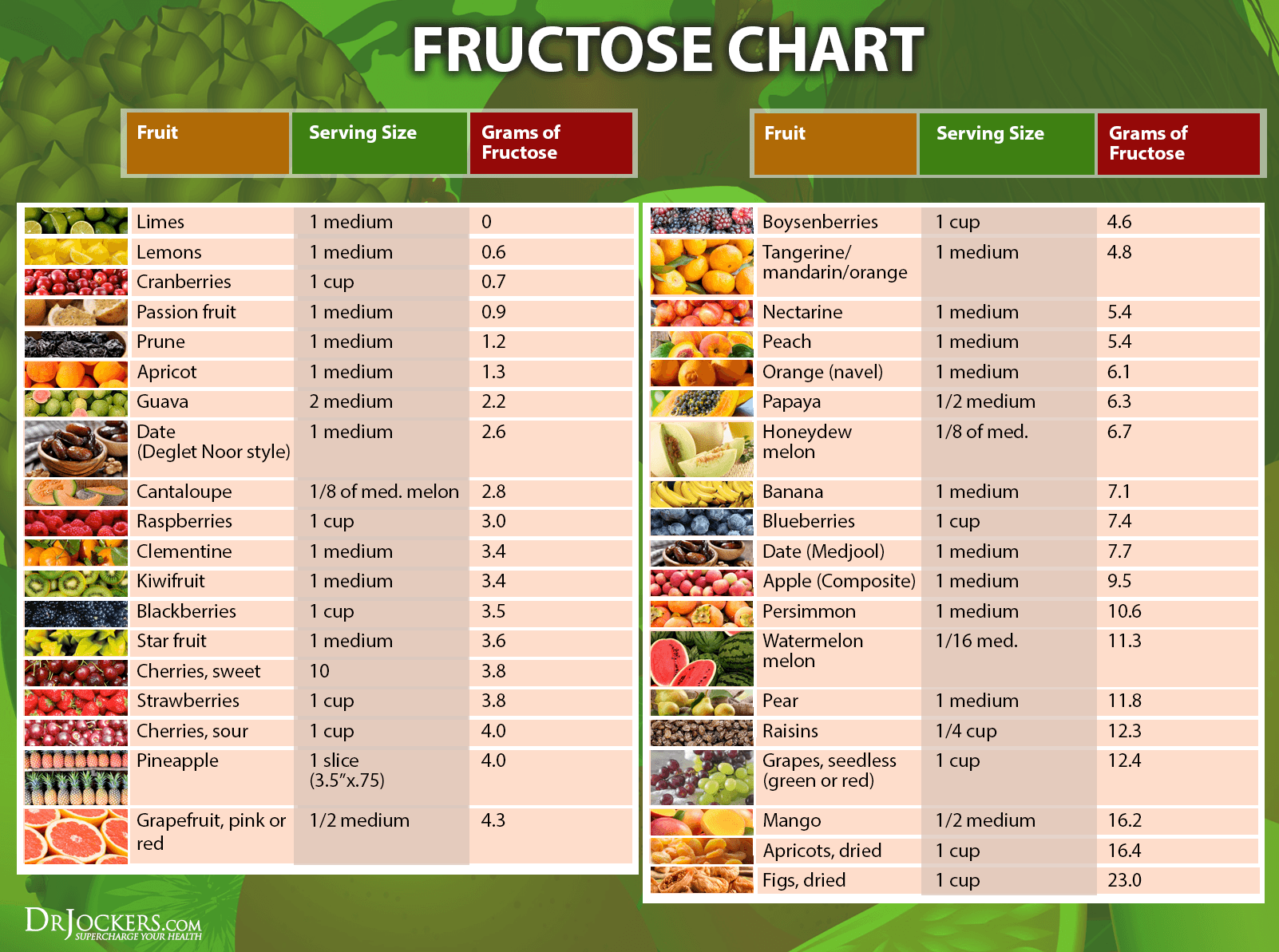
6. Use Lemon/Lime and Avoid High Dose Vitamin C Supplementation
Adding lemon or lime to your water increases citrate content and adds vitamin C and B6 which reduce kidney stone formation. Consider doing my anti-inflammatory lemonade recipe.
The research appears to show that high dosages of vitamin C without high doses of B6 can increase oxalate content and elevate the risk of kidney stone formation. Keep vitamin C supplementation down to 1-2 grams daily or use 10mg of B6 per gram of vitamin C if you choose to supplement higher.

7. Consume Magnesium & B Vitamin Rich Foods:
Magnesium and B vitamins help improve the alkali content of the body and reduce free oxalate and uric acid production. If you are on a low-oxalate diet be sure to consume lots of bok choy, broccoli, cabbage, cauliflower, grass-fed butter and cheese, and flax seeds which are low oxalate and high in magnesium and B vitamins.
You should also consider supplementing with a high quality magnesium and B complex supplement. Look for one with pre-activated forms of B vitamins such as methyl-folate, methyl-cobalamin (B12), Pyridoxal-5-Phosphate form of B6, and Riboflavin-5-phosphate form of vitamin B2. The methyl groups are in the active form and will be better utilized by the body.

8. Consume High Quality Salts:
Get rid of all forms of processed sodium and consume non-processed sea salt and pink salts like Himalayan Sea salt. These salts are very healthy for the body and help to optimize cellular energy production and fluid volume in and out of the cells.
The best salts that I recommend are Celtic Sea Salt, Redmond’s Real Salt, and the Himalayan Sea Salt. Use these salts generously as you are hydrating your body well and will need good salts for optimal energy and kidney function.
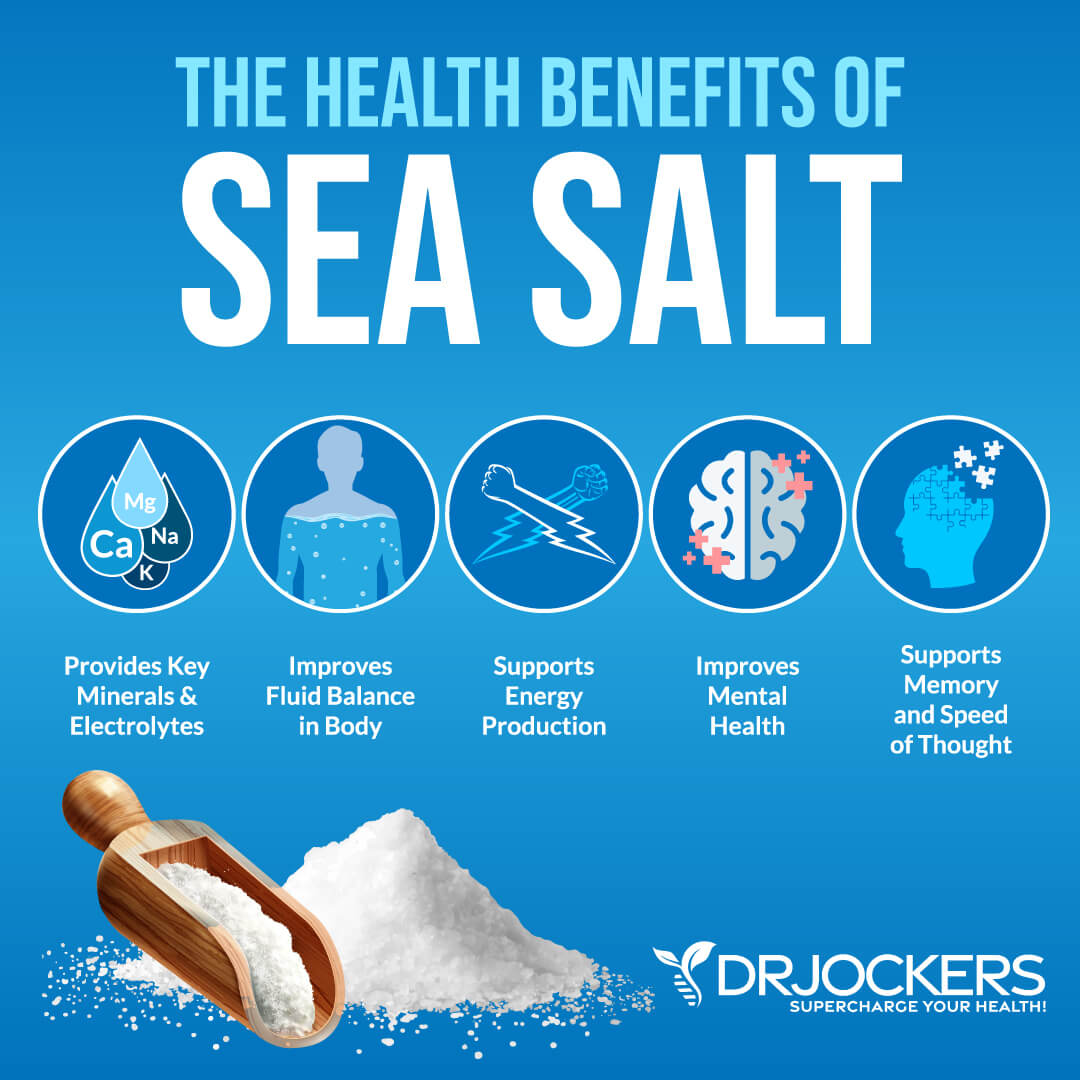
9. Use Kidney Supportive Herbs:
Herbs known to support the kidneys and reduce the risk of kidney stone formation include parsley, nettle, hibiscus and bearberry (uva ursi) leaf. I recommend drinking nettle tea, parsley tea or uva ursi tea on a daily basis.
I also recommend D-mannose which is a carbohydrate that attracts bacteria and helps flush them out of the kidneys. My favorite kidney herb is parsley as it contains about three times the amount of vitamin C by volume as an orange. Additionally, rich in flavonoids-including apiin, apigenin, crisoeriol, and luteolin as well as carotenoids lutein, and zeaxanthin that have strong antioxidant and kidney supportive properties.

10. Improve Your Gut Motility:
Improving bowel movement frequency and consistency is a key detoxification concept. You should be moving your bowels at least 1-2 times per day and feeling like you have cleared out all the waste in your system every 24 hours.
So, if you finish your dinner at 7 PM, the waste from that meal should be eliminated through the stool by 7 PM the following evening. It is really important to optimize hydration in order to have high quality bowel movements each day. Consuming an anti-inflammatory diet with good fiber sources such as chia seed and flax seed, using bone broths, fermented foods, and probiotics will improve bowel motility.
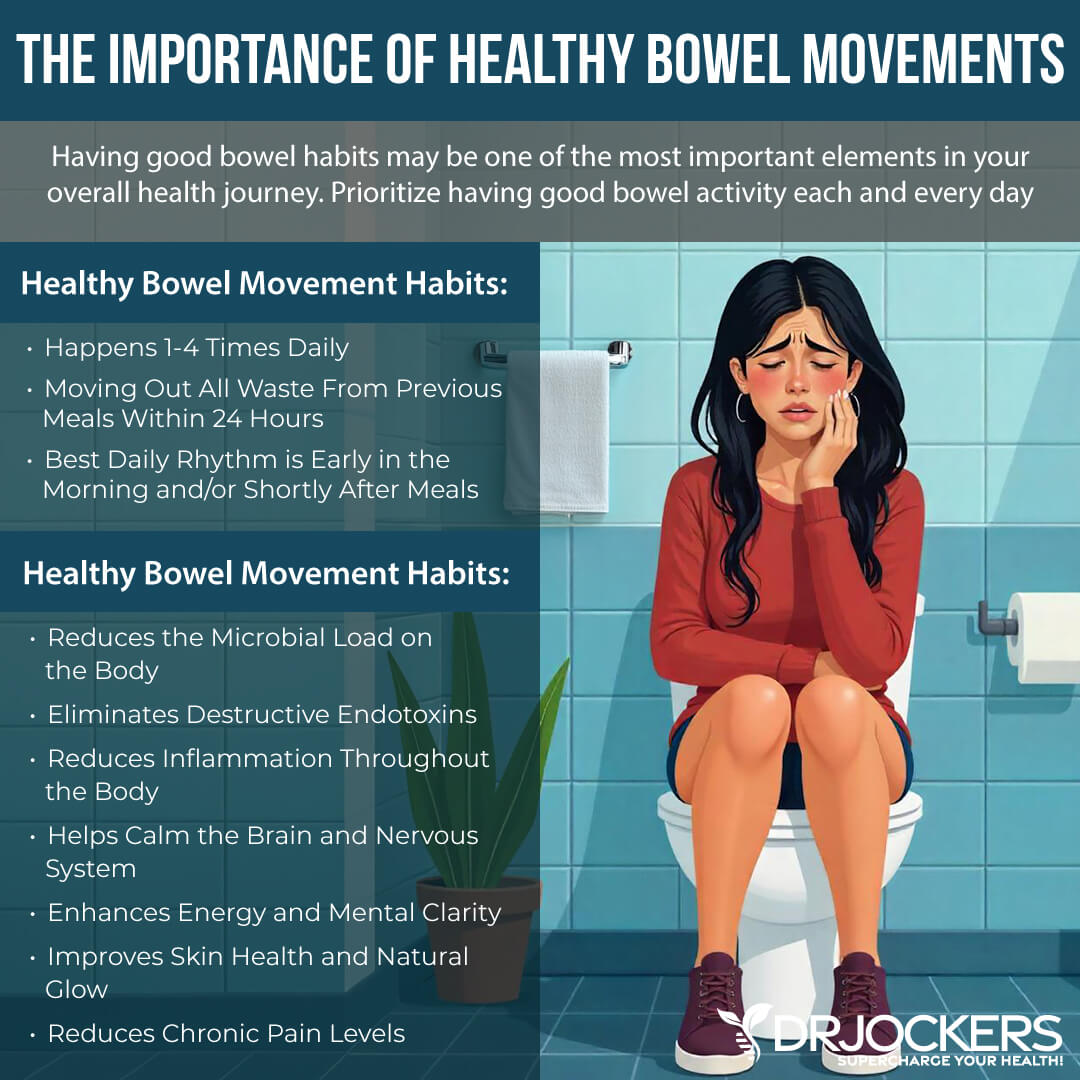
11. Use a Potassium Citrate Supplement:
Studies have shown that potassium citrate helps to reduce kidney stone formation (30, 31). I recommend a combination of magnesium and potassium citrate for best results. Taking the citrate supplement with meals helps get the citrate in with the oxalates and allows it to bind to the oxalates for removal from the body.
You typically want to find a low dose of magnesium and potassium so there shouldn’t be a concern with getting too much of these electrolytes. However, if you have kidney failure and have been advised to reduce potassium consumption then do not use this without first discussing it with your physician.
12. Optimize Vitamin D to Avoid Kidney Stones:
Optimizing your vitamin D levels is important as it helps to improve the calcium metabolism in your body. When you have low vitamin D levels, you are more likely to have more calcium build up in your urine which increases the risk of kidney stone development.
Optimize your vitamin D levels by spending time in the sun, eating vitamin D-rich foods, including fatty fish, beef liver, and egg yolk, and taking vitamin D supplements. You want to get your vitamin D (25-OH vitamin D) levels tested at least twice per year to get and keep your levels over 50 ng/ml.

Final Thoughts on Kidney Stones
Kidney stones are a condition that causes a lot of pain and suffering and can lead to permanent damage to the kidneys and urinary system. It is important to understand the root cause factors and have natural support strategies that promote healthy kidney function.
If you want to work with a functional health coach, I recommend this article with tips on how to find a great coach. On our website, we offer long-distance functional health coaching programs. For further support with your health goals, just reach out—our fantastic coaches are here to support your journey.
Inflammation Crushing Ebundle
The Inflammation Crushing Ebundle is designed to help you improve your brain, liver, immune system and discover the healing strategies, foods and recipes to burn fat, reduce inflammation and Thrive in Life!
As a doctor of natural medicine, I have spent the past 20 years studying the best healing strategies and worked with hundreds of coaching clients, helping them overcome chronic health conditions and optimize their overall health.
In our Inflammation Crushing Ebundle, I have put together my very best strategies to reduce inflammation and optimize your healing potential. Take a look at what you will get inside these valuable guides below!
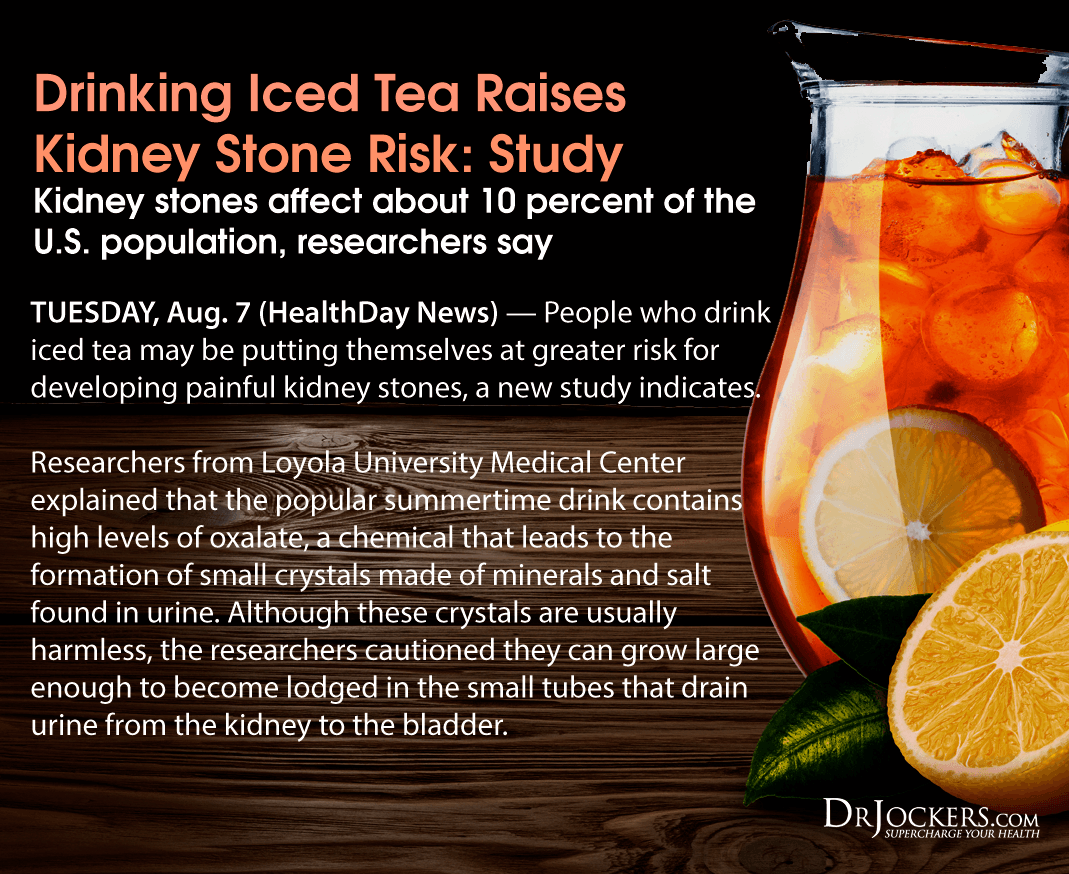
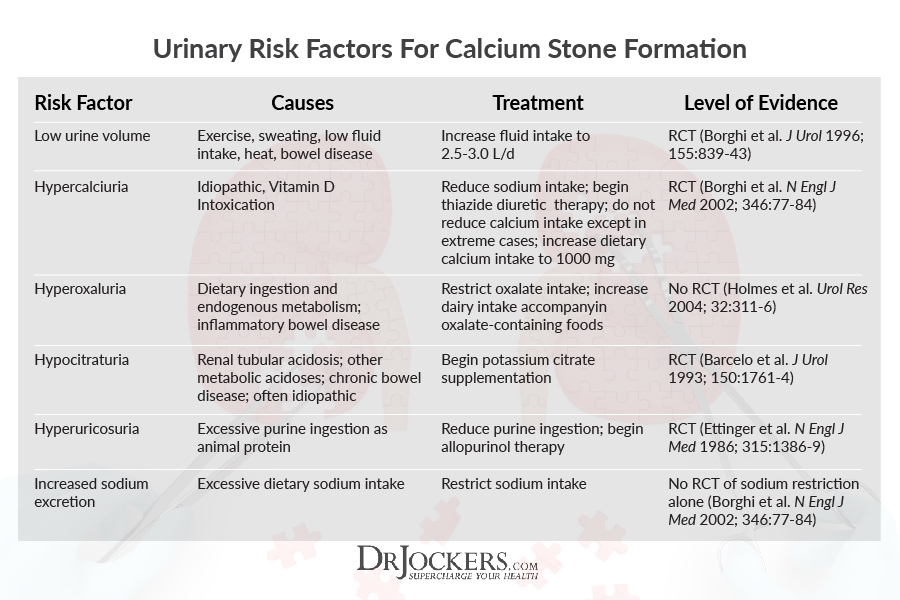
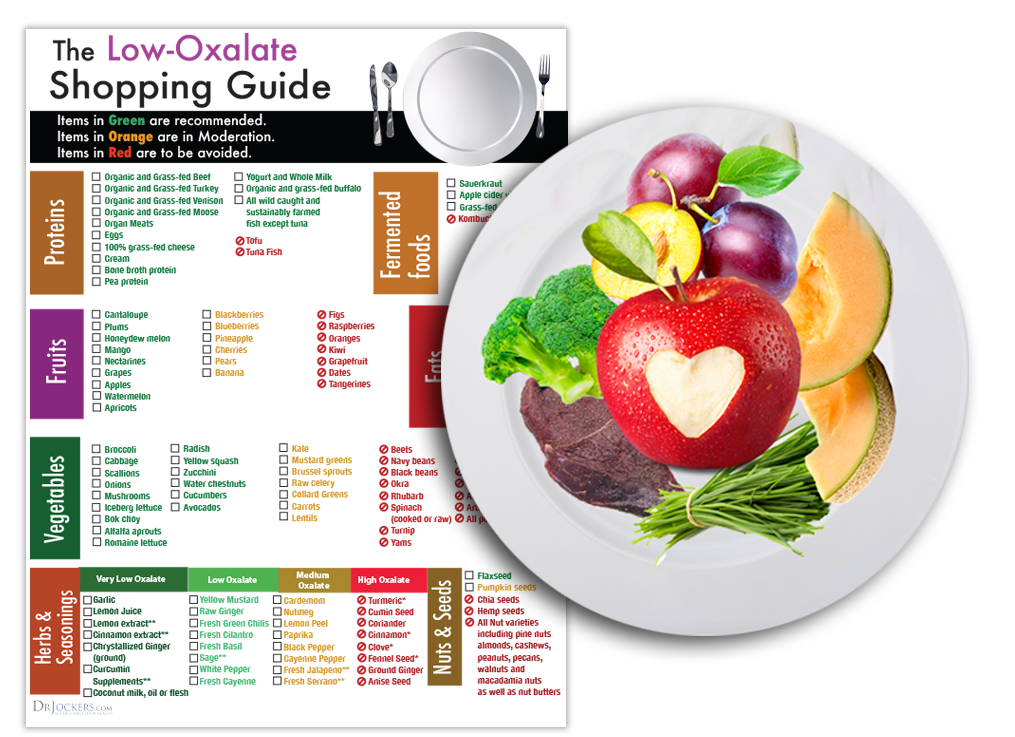

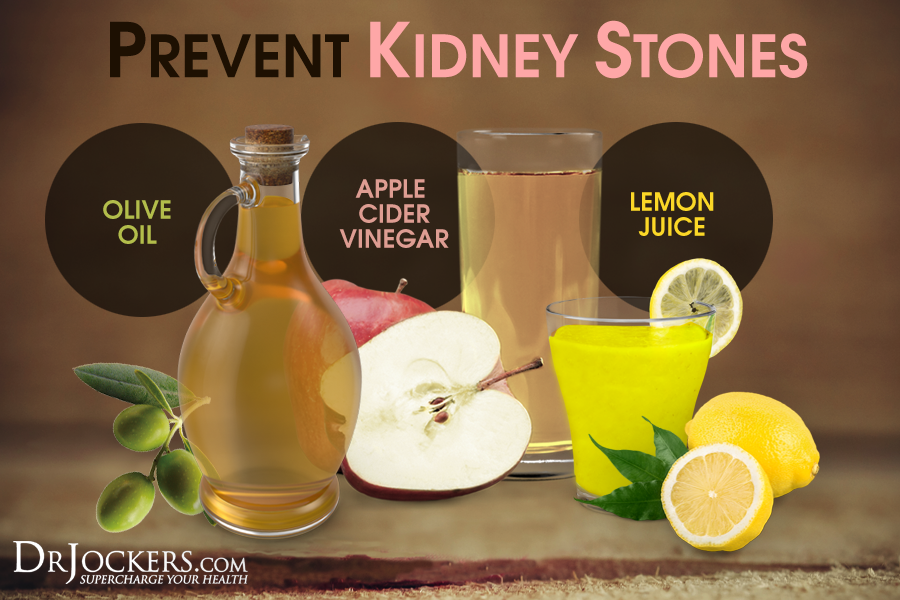
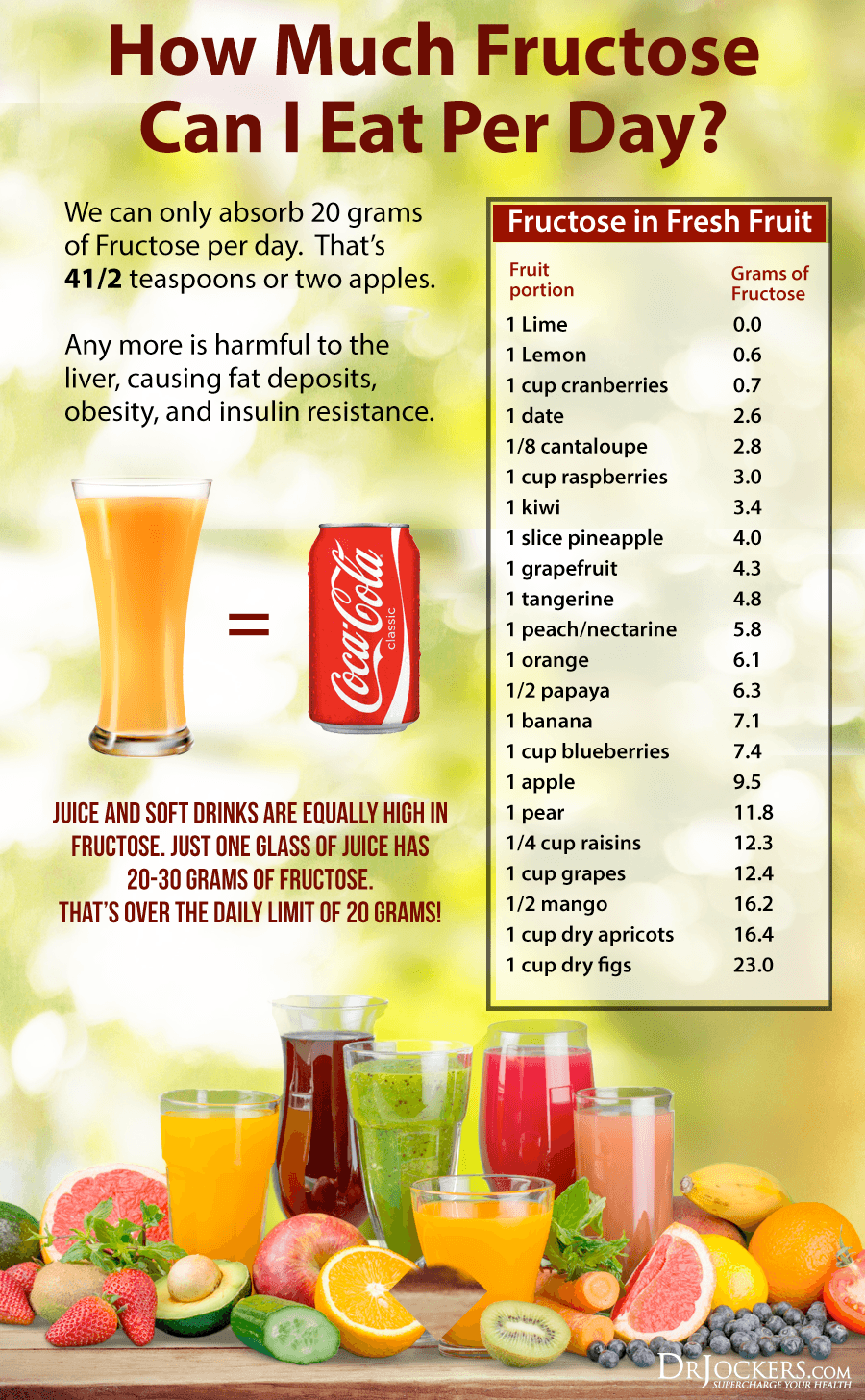




Hello. Several herbs (turmeric, cinnamon, etc) were listed in the article to consume, yet in the guide, they were listed in red. Please clarify. Thank you
Great information, thank you will share with my clients
About avoiding nuts and grains: the Weston Price Foundation has plenty of info on how to prepare these foods so as to avoid the antinutrients that would cause kidney and other problems. Traditional people knew how to do these things.
Thank you for sharing your source Samia!
I have lower middle left side pain maybe going into back some
I thought maybe it was pulled muscle
from lifting heavy steam cleaner 5 times in and out of vehicle over the holidays in a 2 day period
I’m thinking it could be kidney stones
I havent drank alot of water the last few weeks like I normally do but I’ve been traveling and have ate bad which is not normal
Would it hurt to do this lemon juice and olive oil concoction as described above for possibility of kidney stones . If it’s kidney stones the onset started several days ago not just now I guess what I’m saying is if kidney stones started several days ago is it ok to start this several days later after onset ?
No other symptoms
Hey Sandra – sorry to hear this! Yes you can start doing this and it may help. Blessings!
Thank you but now I think it may be an intestinal issue or diverticulitis (from the pain) (no other symptoms) which I’ve never had before but I caused it and ate bad last weekend. I don’t normally eat as bad as I did. I’ll have to contact Danielle when she gets back but I went ahead and started bone broth sauerkraut grass fed wieners lots more water sticking to a healthier diet you suggest.
I have an oat test to take when I get back to SC so I’ll know Danielle will get me straight. She helped me with H Pylori that I didn’t know I had back in the spring. But now i need to ease my nagging pain in lower front left and going into my lower back ; heating pad helps
I’m getting back on my HCL pepsin and enyzymes and I just started back to culturalle today
I’m just wondering if I should stick to broth and water fir a few days but I feel like I need the fiber to keep things going
But I’m glad the lemon juice and oil is a good plan if I experience kidney stones in future
The lemon juice and olive oil protocol, is that once a day? If so, for how long?
Hey Julia,
Do it 2x a day for a week if you are noticing kidney stone symptoms!
Excellent article! Staghorn stones are not mentioned. Is there a protocol for dissolving large steruvite stones to avoid having surgery? Is that even possible?
Hello Lili, yes unfortunately there is no miracle protocol for these larger stones but you can try the options in this article and you may need to get them lasered. Praying for you!